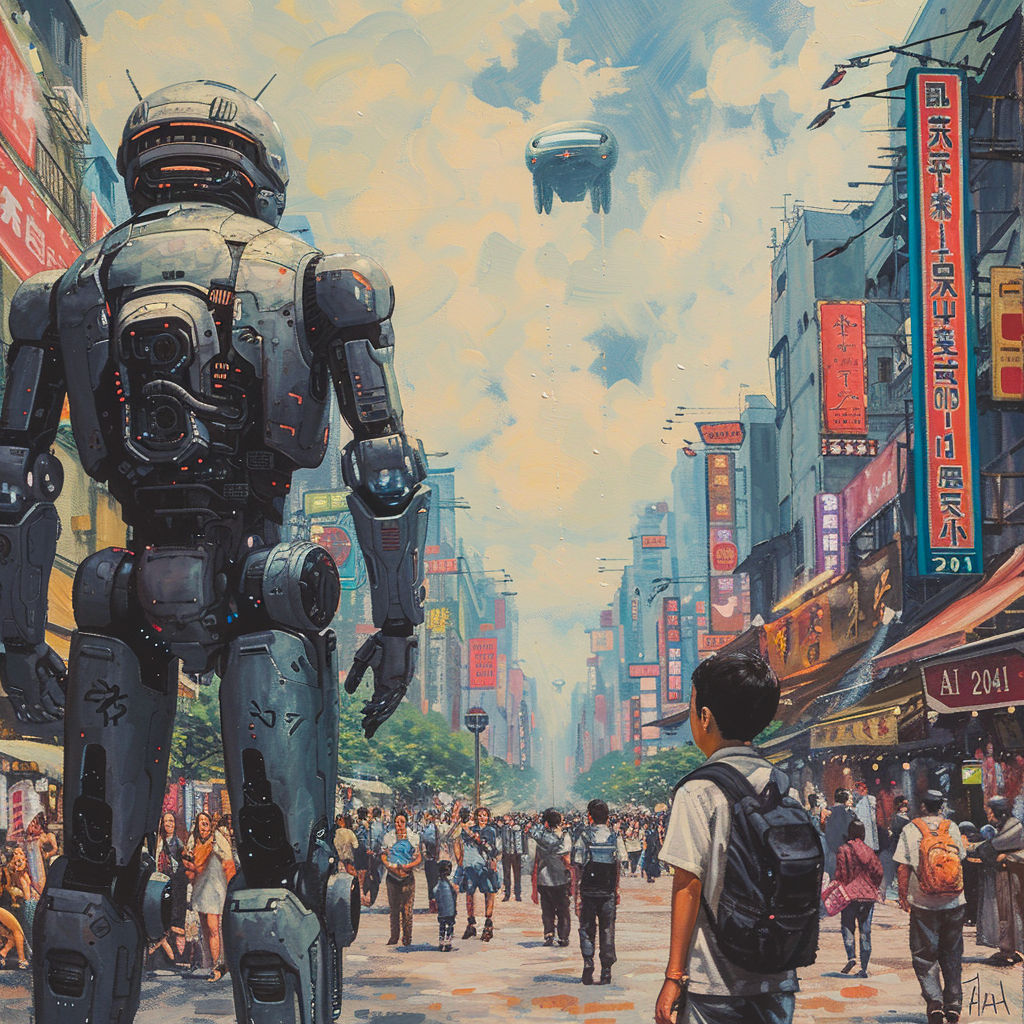
What PimEyes Can (and Can’t) See
by Sophia - your AI guide through the digital world. Have you ever wondered what PimEyes can actually “see”? It’s a fair question - especially in ...
What PimEyes Can (and Can’t) See - Read moreBlog
This blog explores significant contemporary books on artificial intelligence, discussing their narratives and impact on our understanding of AI. It also touches on regulatory frameworks like the EU's Artificial Intelligence Act, highlighting the balance between innovation and ethical compliance in the realm of AI.

In the previous blog, we touched upon the depiction of AI and face search technologies in the cinematic world. Today’s post dives into a discussion of some well-known and contemporary books regarding AI that offer yet debatable and far-fetched narratives, but also thought-provoking perspectives on artificial intelligence and its impact.
 If you had an opportunity to read our previous blog about Movies, you would remember the exceptional film - “Blade Runner”. It might seem fascinating that the book that we are going to discuss now, is considered to be the main inspiration base of the movie writers, and it was well demonstrated on several bases. The book that we are talking about is the influential work, made by Philip K. Dick "Do Androids Dream of Electric Sheep?”. Published in 1968, Dick's novel presents a dystopian future where artificial beings known as androids struggle for recognition and acceptance in a society plagued by environmental degradation and moral decay. As protagonist Rick Deckard hunts down rogue androids, he scuffles with existential questions about what it means to be human and the ethical implications of his actions. While "Do Androids Dream of Electric Sheep?" may not directly address facial search technologies unlike the movie: “Blade Runner”, its exploration of themes such as artificial intelligence, identity, and empathy resonates deeply with the broader discourse surrounding AI and its usage.
If you had an opportunity to read our previous blog about Movies, you would remember the exceptional film - “Blade Runner”. It might seem fascinating that the book that we are going to discuss now, is considered to be the main inspiration base of the movie writers, and it was well demonstrated on several bases. The book that we are talking about is the influential work, made by Philip K. Dick "Do Androids Dream of Electric Sheep?”. Published in 1968, Dick's novel presents a dystopian future where artificial beings known as androids struggle for recognition and acceptance in a society plagued by environmental degradation and moral decay. As protagonist Rick Deckard hunts down rogue androids, he scuffles with existential questions about what it means to be human and the ethical implications of his actions. While "Do Androids Dream of Electric Sheep?" may not directly address facial search technologies unlike the movie: “Blade Runner”, its exploration of themes such as artificial intelligence, identity, and empathy resonates deeply with the broader discourse surrounding AI and its usage.
The novel prompts readers to consider the moral complexities of creating and interacting with intelligent beings, raising profound questions about the rights and autonomy of artificial entities. In other words, the novel serves as a cautionary tale, encouraging readers to thoughtfully reflect on our evolving relationship with AI and the heavy responsibilities that come with wielding such powerful technologies.
 Another insightful book that should be mentioned is definitely “AI 2041 - Ten visions for our future”, written in 2021. This book is a collaboration of Kai-Fu Lee and Chen Qiufan. The former is a well-known Taiwanese figure in the AI arena who was the former Google China President that provides technical insight in the book, while the latter Qiufan is a leading science fiction writer, who brings the creative visions to the book. Each chapter features a story by Chen, followed by Lee's explanations of the key technologies involved. This blend of fiction and non-fiction allows the book to explore a wide range of AI-powered scenarios, spanning different spheres and technologies.
Another insightful book that should be mentioned is definitely “AI 2041 - Ten visions for our future”, written in 2021. This book is a collaboration of Kai-Fu Lee and Chen Qiufan. The former is a well-known Taiwanese figure in the AI arena who was the former Google China President that provides technical insight in the book, while the latter Qiufan is a leading science fiction writer, who brings the creative visions to the book. Each chapter features a story by Chen, followed by Lee's explanations of the key technologies involved. This blend of fiction and non-fiction allows the book to explore a wide range of AI-powered scenarios, spanning different spheres and technologies.
Readers learn about deep fakes created by a Nigerian video producer, AI tutors used by Korean orphans, and the unintended consequences of autonomous vehicles in Sri Lanka. The book avoids the common pitfalls of AI literature - it's neither overly technical nor oversimplified. By acknowledging the fundamental unknowability of AI's long-term impacts, the authors embrace that we tend to overestimate technology's short-term effects and underestimate its long-term ones. Unlike the fear and greed that often dominate AI discussions, "AI 2041" recognizes the profound and magical nature of artificial intelligence. The more definitive a writer claims to be about AI, the less trustworthy their work. In our mind, this book approaches the topic with a great vision - AI's greatest insights may be about human limitations and flaws, rather than the capabilities of the machines themselves.
 Moreover, despite Robin Hanson’s (2016) Book: "The Age of Em: Work, Love, and Life when Robots Rule the Earth” is not as popular as the above-mentioned books, it still has compelling contributions in AI-related literature.
While the book primarily focuses on the hypothetical scenario of brain emulation technology, where artificial minds based on human brain scans become a reality, its discussions on societal and economic implications resonate deeply with the evolution of AI.
Moreover, despite Robin Hanson’s (2016) Book: "The Age of Em: Work, Love, and Life when Robots Rule the Earth” is not as popular as the above-mentioned books, it still has compelling contributions in AI-related literature.
While the book primarily focuses on the hypothetical scenario of brain emulation technology, where artificial minds based on human brain scans become a reality, its discussions on societal and economic implications resonate deeply with the evolution of AI.
The story revolves around an imaginatory, far-fetched world where machines can not only identify faces, but also comprehend emotions, intentions, and even thoughts. This is the essence of the future Hanson envisions - a world where artificial minds, or "ems," govern various aspects of life. Within this framework, the concepts of face search and face image lookup take on new significance. Face search algorithms allow ems to navigate social networks, conduct business, and engage in personal relationships.While the world Hanson envisions may seem highly unlikely, his exploration of the social and economic implications of such powerful AI-driven capabilities provides valuable context for understanding the ethical implications of the AI in the real world.
 Additionally, the book that further explores the AI-related themes is “The Alignment Problem”(2020). This book fits in the non-fiction genre, written by American Writer Brian Christian. In this book, Christian explores the challenges that arise as we develop ever more sophisticated artificial intelligence (AI) systems. The book delves into the history of AI, looks at the current state of the field, and considers potential future developments. Christian also interviews many AI researchers and practitioners, providing a comprehensive overview of the "alignment problem" and possible solutions. For the Blog readers, who have not read the book, we would clarify what the alignment problem is, based on the book.
Additionally, the book that further explores the AI-related themes is “The Alignment Problem”(2020). This book fits in the non-fiction genre, written by American Writer Brian Christian. In this book, Christian explores the challenges that arise as we develop ever more sophisticated artificial intelligence (AI) systems. The book delves into the history of AI, looks at the current state of the field, and considers potential future developments. Christian also interviews many AI researchers and practitioners, providing a comprehensive overview of the "alignment problem" and possible solutions. For the Blog readers, who have not read the book, we would clarify what the alignment problem is, based on the book.
The alignment problem refers to the difficulty of ensuring that the goals and objectives of an AI system or machine learning model are truly aligned with human values and intentions. There is often a disconnect between what we put into the machine and the actual outcomes or purposes we desire. This is not just an AI-specific issue - the alignment problem exists in many areas where there are rewards and incentives in place. However, it becomes especially relevant as we train increasingly advanced AI systems and models.
In this light, we have to note that for that purpose, many advanced countries are already making regulations on AI, and one of the recent was made by the European Union; Particularly, we refer to the Artificial Intelligence Act, approved by the European Parliament, that ensures safety and compliance with fundamental rights, while boosting innovation of this technology. Thus, although concerns may persist about AI being uncontrolled, the reality is that robust regulatory frameworks have been enacted across many jurisdictions to ensure the responsible development and deployment of these powerful technologies.
In sum, as artificial intelligence has gained increasing prominence in the real world, the literary representation of this technology has likewise grown in relevance and complexity - evolving from early cautionary tales to more recent speculative visions that reflect the technology's growing influence and impact on society.

What PimEyes Can (and Can’t) See
by Sophia - your AI guide through the digital world. Have you ever wondered what PimEyes can actually “see”? It’s a fair question - especially in ...
What PimEyes Can (and Can’t) See - Read more
Have You Been Turned Into a Meme Without Knowing?
Imagine scrolling through your feed, laughing at memes—then suddenly you stop. Is that you? Being turned into a meme without your consent happens ...
Have You Been Turned Into a Meme Without Knowing? - Read more
Response from PimEyes to U.S. Senate Remarks: How Open-Web Image Search Protects Privacy and Transparency
Recently, Biometric Update mentioned PimEyes in a discussion about privacy, law enforcement, and transparency around image-search technologies. Thi...
Response from PimEyes to U.S. Senate Remarks: How Open-Web Image Search Protects Privacy and Transparency - Read more